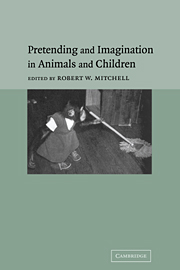Book contents
- Frontmatter
- Contents
- List of contributors
- Foreword by Sue Taylor Parker
- Preface and acknowledgments
- I Historical, developmental, and comparative overviews
- II Pretense and imagination in children
- 4 Language in pretense during the second year: what it can tell us about “pretending” in pretense and the “know-how” about the mind
- 5 A longitudinal and cross-sectional study of the emergence of the symbolic function in children between 15 and 19 months of age: pretend play, object permanence understanding, and self-recognition
- 6 Caregiver-child social pretend play: what transpires?
- 7 Just through the looking glass: children's understanding of pretense
- 8 Young children's understanding of pretense and other fictional mental states
- 9 Pretend play, metarepresentation and theory of mind
- 10 Replica toys, stories, and a functional theory of mind
- 11 Young children's animal-role pretend
- 12 Imaginary companions and elaborate fantasy in childhood: discontinuity with nonhuman animals
- III Pretense and imagination in primates
- IV Prospects
- References
- Author Index
- Subject Index
8 - Young children's understanding of pretense and other fictional mental states
Published online by Cambridge University Press: 13 August 2009
- Frontmatter
- Contents
- List of contributors
- Foreword by Sue Taylor Parker
- Preface and acknowledgments
- I Historical, developmental, and comparative overviews
- II Pretense and imagination in children
- 4 Language in pretense during the second year: what it can tell us about “pretending” in pretense and the “know-how” about the mind
- 5 A longitudinal and cross-sectional study of the emergence of the symbolic function in children between 15 and 19 months of age: pretend play, object permanence understanding, and self-recognition
- 6 Caregiver-child social pretend play: what transpires?
- 7 Just through the looking glass: children's understanding of pretense
- 8 Young children's understanding of pretense and other fictional mental states
- 9 Pretend play, metarepresentation and theory of mind
- 10 Replica toys, stories, and a functional theory of mind
- 11 Young children's animal-role pretend
- 12 Imaginary companions and elaborate fantasy in childhood: discontinuity with nonhuman animals
- III Pretense and imagination in primates
- IV Prospects
- References
- Author Index
- Subject Index
Summary
the gift of fantasy has meant more to me than my talent for absorbing positive knowledge.
albert einstein (cited in Colburn, 1985)Awareness of non-realities
Our capacity for fantasy has often been touted as one of the unique attributes that defines us as human. As early as 18 months many human children have entered the realm of fantasy through their engagement in pretend play. Although we are not certain of this, even younger infants may enter this realm via their dreams. And certainly way into old age we enjoy reading novels, going to plays, and engaging in elaborate day-dreams. The question addressed in this chapter is the nature of our conscious understanding of this fantastical realm, in particular the understanding that young preschool-age children display. The understanding of this age group is the focus, because many believe that at this age children begin to consider the fantastical and to make a conscious division of their world into real and not-real, a distinction that is basic to and deeply entrenched in our adult thinking.
There are many levels of reality and many varieties of non-realities. As Austin (1962, p. 67) put it, “That may not be real duck because it is a decoy, or a toy duck, or a species of goose closely resembling a duck, or because I am having a hallucination.” In previous work (Woolley & Wellman, 1990) I have investigated the extent to which children talk about the many levels of reality in their everyday conversation.
- Type
- Chapter
- Information
- Pretending and Imagination in Animals and Children , pp. 115 - 128Publisher: Cambridge University PressPrint publication year: 2002
- 2
- Cited by



